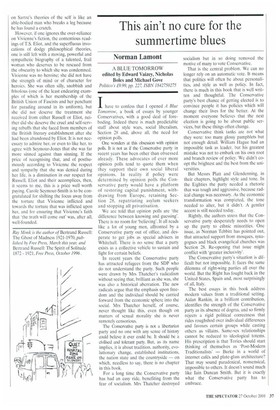This ain't no cure for the summertime blues
Norman Lamont
A BLUE TOMORROW edited by Edward Vaizey, Nicholas Boles and Michael Gove Politico's £9.99, pp. 227, ISBN 1842750275 Ihave to confess that I opened A Blue Tomorrow, a book of essays by younger Conservatives, with a good deal of foreboding. Indeed there is much predictable stuff about style wars, social liberalism, Section 28 and, above all, the need for opinion polls.
One wonders at this obsession with opinion polls. It is not as if the Conservative party in recent years has been other than obsessed already. These advocates of ever more opinion polls tend to quote them when they support their own social liberal opinions. In reality if policy were determined by opinion polls the Conservative party would have a platform of restoring capital punishment, withdrawing from Europe, retaining Section 28, repatriating asylum seekers and stopping all privatisation.
We are told that opinion polls are 'the difference between knowing and guessing'. There is no room for 'believing'. It all reads like a lot of young men, affronted by a Conservative party out of office, and desperate to get jobs as special advisers in Whitehall. There is no sense that a party exists as a collective vehicle to sustain and fight for certain beliefs.
In recent years the Conservative party has attracted refugees from the SDP who do not understand the party. Such people were drawn by Mrs Thatcher's radicalism without seeing that, brilliant as she was, she was also a historical aberration. The new radicals argue that the emphasis upon freedom and the individual should be carried forward from the economic sphere into the social. Mrs Thatcher herself, of course, never thought like this, even though on matters of sexual morality she is never remotely censorious.
The Conservative party is not a libertarian party and no one with any sense of history could believe it ever could be. It should be a civilised and tolerant party. But, as its name implies, it is about tradition, authority, evolutionary change, established institutions, the nation state and the countryside — on which, needless to say, there is no chapter in this book.
For a long time the Conservative party has had an easy ride, benefiting from the fear of socialism. Mrs Thatcher destroyed socialism but in so doing removed the motive of many to vote Conservative.
That is the central problem. We can no longer rely on an automatic vote. It means that politics will often be about personalities, and style as well as policy. In fact, there is much in this book that is well written and thoughtful. The Conservative party's best chance of getting elected is to convince people it has policies which will change their lives for the better. At the moment everyone believes that the next election is going to be about public services, but these things often change.
Conservative think tanks are not what they were: too many glossy pamphlets but not enough detail. William Hague had an impossible task as leader, but his greatest mistake was not to embark on his own root and branch review of policy. We didn't coopt the brightest and the best from the universities.
But Messrs Platt and Glendenning, in their chapters, highlight style and tone. In the Eighties the party needed a rhetoric that was tough and aggressive, because radical change was necessary. As the economic transformation was completed, the tone needed to alter, but it didn't. A gentler accent is still needed today.
Rightly, the authors stress that the Conservative party desperately needs to open up the party to ethnic minorities. One issue, as Norman Tebbitt has pointed out, that attracted support from mosques, synagogues and black evangelical churches was Section 28. Re-opening that issue might conflict with 'greater inclusivity'.
The Conservative party's situation is difficult but not impossible. It faces the same dilemma of right-wing parties all over the world. But the Right has fought back in the United States, Spain and, most surprisingly of all, Italy.
The best essays in this book address modern values from a traditional setting. Aidan Rankin, in a brilliant contribution, identifies the strength of the Conservative party as its absence of dogma, and so firmly rejects a rigid political correctness that rides roughshod over individual differences and favours certain groups while casting others as villains. Same-sex relationships cannot be reduced to ideological totems. His prescription is that Tories should start thinking of themselves as 'Post-Modern Traditionalists' — Burke in a world of internet cafés and plate-glass architecture? That may sound paradoxical, nonsensical, impossible to others. It doesn't sound much like lain Duncan Smith. But it is exactly what the Conservative party has to embrace.










































































 Previous page
Previous page